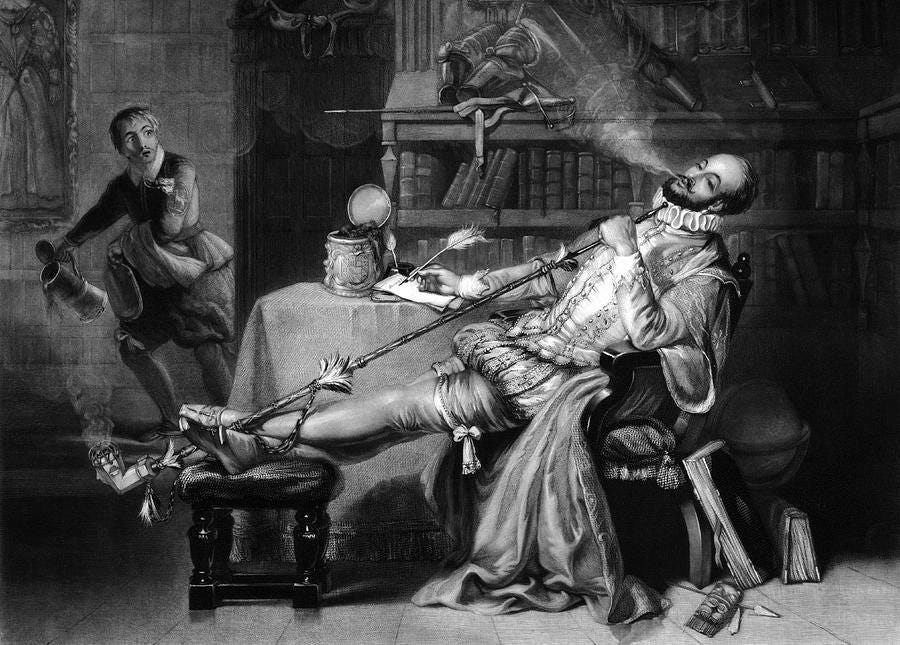Season 29, Day 20 - "You Can Smoke This Quiz"
It's Explorer week, and today's quiz is inspired by Sir Walter Raleigh.
Sir Walter Raleigh
“I’ll have another cigarette and curse Sir Walter Raleigh”
—The Beatles, “I’m So Tired”
Sir Walter Raleigh was an Elizabethan courtier and adventurer. Born in Devon, England in the mid-16th century, as a teenager he fought with the Huguenots in France’s religious civil wars. He was granted a royal charter to explore the New World and claimed Virginia for England in 1584, and he may have given the region its name (in honor of Elizabeth I, the Virgin Queen). When he returned, he brought the first tobacco back to England, and is credited with popularizing tobacco smoking there after eventually getting Elizabeth to try it. He also introduced potatoes to Europe, planting them on his Irish estate. Raleigh is considered the founder of the first English settlement in North America, the lost colony of Roanoke (though he only sponsored the expedition and never actually made the trip himself). Roanoke was the birthplace of Virginia Dare (the first English child born in the Americas), who disappeared from the area along with the other colonists some time around 1590. Located on the island of the same name in the Outer Banks of North Carolina (whose capital city is named for Sir Walter Raleigh), the site of the former colony is preserved at Fort Raleigh, where an outdoor drama titled “The Lost Colony” is performed. A young Andy Griffith played the role of Raleigh in that production for several seasons; a better known portrayal is Clive Owen in the movie Elizabeth: The Golden Age. Raleigh quickly became a favorite of Elizabeth; he was knighted in 1585 and became captain of the Queen’s Guard in 1587, eventually witnessing the execution of the Earl of Essex, his rival for her affections. According to legend, he once placed his cloak over a mud puddle so the Queen could walk over it, earning him his nickname “The Knight of the Cloak.” He fell out of favor with Elizabeth I when he married another Elizabeth — one of the Queen’s maids of honor — without the Queen’s permission. Attempting to win her back, Raleigh promised to find El Dorado, the fabled city of gold. He sailed up the Orinoco River, exploring what is now Guyana, but failed to discover El Dorado. Raleigh was also a notable poet; a contemporary of Shakespeare, he may have been the inspiration for the character of Don Armado in Love’s Labour’s Lost. Raleigh encouraged Edmund Spenser to publish his epic poem “The Faerie Queene” and wrote the sonnet that serves as its preface. Raleigh’s “The Nymph’s Reply to the Shepherd” was written as a response to the Christopher Marlowe poem “The Passionate Shepherd to His Love.” After Queen Elizabeth’s death, Raleigh was tried and convicted of treason for his involvement in a plot against her successor James I. As a result, he was imprisoned in the Tower of London for 14 years, where he wrote an unfinished non-fiction book titled The History of the World. In 1617, Raleigh finally convinced King James I to pardon him so he could conduct a second expedition in search of El Dorado. However, during this expedition his men attacked a Spanish outpost, which was a violation of peace treaties as well as Raleigh’s orders from the king. Raleigh’s treason conviction was reinstated, and though he insisted upon his innocence, he was beheaded in 1618. He’s said to have smoked his pipe before his execution, and his last words were: “So the heart be right, it is no matter which way the head lieth.”




